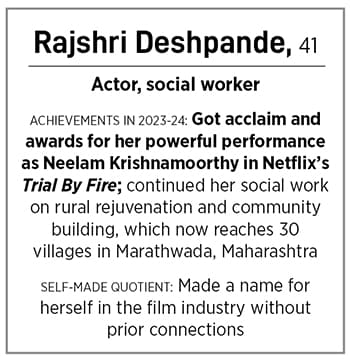Rajshri Deshpande: Rebel with a cause...
Whether it's performing in front of the camera or working with communities in remote villages, Rajshri Deshpande is following her own path


In a conversation that lasts over an hour, Rajshri Deshpande makes frequent references to Justine Triet’s Anatomy of a Fall. She believes the making of the film would have been an “evolved process" and a “spiritual journey". It is mid-February. In a few days’ time, Anatomy of a Fall, which follows writer Sandra as she tries to prove her innocence in husband Samuel’s death, would win big at the Césars, and an Academy Award for Best Original Screenplay.
Deshpande wishes to be part of such projects in India too. “But where do we have such spaces? Where there is no hierarchy, just empathy and equality," she says. The actor had the biggest success in 2023. Her lead role in Netflix’s show Trial By Fire, which is based on the 1997 Uphaar cinema tragedy in Delhi, won her critical and commercial acclaim, and awards. She also played the role of Savitribai Phule in the Marathi film, Satyashodhak.
Acting career apart, there’s something else that takes up much space in our conversation, just like it has in Deshpande’s life. Over the past year, she has been working with 30-odd drought prone villages in Marathwada district in Maharashtra, continuing the efforts that she had started in 2015-16. In these villages, she addresses issues like rejuvenating groundwater, building schools and toilets, and conducting gender sensitisation through her non-profit, Nabhangan Foundation.
 Her scale is not massive, the actor adds, as she does most of the work herself with help from members of the community. She works closely with local people and government officials for a few years. Once they become self-reliant, she hands over the reins to the community and moves on to the next village. The resources for her social work come from crowdfunding, donations from people in her network, and experts who extend voluntary support.
Her scale is not massive, the actor adds, as she does most of the work herself with help from members of the community. She works closely with local people and government officials for a few years. Once they become self-reliant, she hands over the reins to the community and moves on to the next village. The resources for her social work come from crowdfunding, donations from people in her network, and experts who extend voluntary support.
“I want to go and find spaces nobody has reached," says Deshpande, 41. In and around Mumbai, she sees loads of funds and media attention going towards causes like beach cleanups and river rejuvenations. While those need support, she feels many privileged people come forward because of the glamour associated with such efforts, rather than wanting to understand and solve root issues, like improper waste management, for instance. “Our activism is often very surface-level," she says.
Growing up in Aurangabad as the youngest of three sisters, Deshpande saw how her family’s farm was taken away by industries. Her parents did odd-jobs, but were determined to help their daughters get educated and take up professional careers. Deshpande moved to Pune to study law and started working with an advertising agency to support her education. She decided to continue with advertising post her degree.
“I came from a small-town and thought money will solve all my problems. I earned a lot of it, but realised I was not happy. I was not learning anything," says Deshpande. This prompted her to move to Mumbai at the age of 28 and take up a two-year film course. As a kid, she had received joy and appreciation for her “nautanki" skills, and felt that pursuing that as a career would give her satisfaction.
Click here for W-Power List 2024
She acted for a year in a Hindi television serial in 2012, and did small roles in films like Talaash and Kick. Her big break came in 2015 with Pan Nalin’s film Angry Indian Goddesses. That year, she went to help with the earthquake relief efforts in Nepal and saw that no matter how much she does for a short period of time, it’s not going to help much. When she went to the Toronto Film Festival with Angry Indian Goddesses, people asked her whether her life had changed after the film. “What could I tell them? When I go back to my village, nothing has changed," she says, adding that she felt disillusioned by the glamour, knowing fully well how people in another part of the world were still suffering. “So I answered that nothing has changed." The person then asked her what she was doing about it, and that question changed her life.
She went back to her roots in Aurangabad to take the first steps. As she delivered strong performances in films like Sexy Durga (2017), Manto (2018) and the web series Sacred Games (2018), she worked on the grassroots, helping one village at a time.

Actors usually live in a bubble, and given their high-pressure lives, it takes constant effort to engage with people and experiences outside of the industry, says Prashant Nair, director, Trial By Fire. “Life outside your acting career informs your acting, and that’s true in Rajshri’s case. The empathy she has with the characters she plays on screen comes from her social work."
Deshpande wants work in films or shows that are true to her beliefs, even if it means signing fewer projects. Her social work, she says, occupies a large part of her life. “When you start working with people on the ground, you start seeing things in a different light. All this glamour seems so shallow," she says.
First Published: Mar 27, 2024, 14:27
Subscribe Now